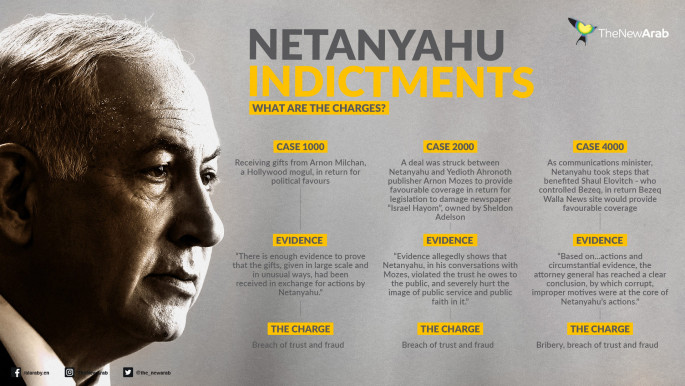Days after UAE normalisation deal, anti-Netanyahu protests resume
Days after UAE normalisation deal, anti-Netanyahu protests resume
Netanyahu's blockbuster announcement Thursday, announcing plans to establish ties with the UAE, appeared to have no effect on protesters' momentum.
2 min read
The rallies against Netanyahu are the largest Israel has seen since 2011 [AFP]
Thousands of Israelis demonstrated outside the official residence of Prime Minister Benjamin Netanyahu on Saturday night, resuming their calls for the embattled leader to step down despite his agreement to normalise relations with the United Arab Emirates.
Israelis have been gathering outside Netanyahu's residence several times a week throughout the summer, protesting his handling of the coronavirus crisis and saying he should not remain in office while on trial for corruption charges.
While Netanyahu has tried to play down the protests, the gatherings appear to be getting stronger.
Even Netanyahu's blockbuster announcement Thursday announcing plans to establish ties with the UAE, making it just the third Arab country currently to have formal diplomatic relations with Israel, appeared to have no effect on the protesters' momentum.
Thousands of people thronged central Jerusalem late Saturday, blaring horns, hoisting Israeli flags and chanting slogans against Netanyahu.
A smaller protest took place near Netanyahu's private beach home in the upscale coastal town of Caesaria, while other gatherings took place on bridges and intersections across the country.
Twitter Post
|
The rallies against Netanyahu are the largest Israel has seen since 2011 protests over the country’s high cost of living.
Even so, they do not appear to pose an immediate threat to Netanyahu.
After moving quickly to contain the virus last spring, many believe Israel reopened its economy too quickly, leading to a surge in cases.
The country is now coping with a spike in cases, while unemployment has surged to over 20%.
Read more: Israel's coronavirus infection rate among world's highest: Netanyahu
Many of the demonstrators, including many young unemployed Israelis, accuse Netanyau of mishandling the coronavirus crisis and the economic damage it has caused.
The demonstrations, taking place several times a week at locations around the country, are organized by a loose-knit network of activist groups.
Some object to Netanyahu remaining in office while he is on trial. He has been charged with fraud, breach of trust and accepting bribes in a series of scandals. Many carry black flags, the name of one of the grassroots movements.

Follow us on Facebook, Twitter and Instagram to stay connected
![Netanyahu protests [Getty] Netanyahu protests [Getty]](/sites/default/files/styles/large_16_9/public/media/images/BAD5816E-AAE6-4469-9DF6-BFAAC887F4C7.jpg?h=d1cb525d&itok=RmqyFfSA)

![President Pezeshkian has denounced Israel's attacks on Lebanon [Getty]](/sites/default/files/styles/image_684x385/public/2173482924.jpeg?h=a5f2f23a&itok=q3evVtko)



 Follow the Middle East's top stories in English at The New Arab on Google News
Follow the Middle East's top stories in English at The New Arab on Google News


